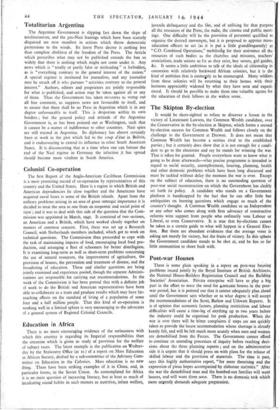Post-war Houses There is some plain speaking in a report
on post-war housing problems issued jointly by the Royal Institute of British Architects, the National House-Builders Registration Council and the Building Societies' Association. Private enterprise will have to play a big part in the effort to meet the need for 4,000,000 houses in the post- war period, but it is pointed out that it cannot adequately plan ahead until the Government says whether or to what degree it will accept the recommendations of the Scott, Barlow and Uthwatt Reports. It is of opinion that economic factors, planning restrictions and labour difficulties will cause a time-lag of anything up to two years before the industry could be organised for peak production. When the war is over there will be bitter complaints if steps are not quickly taken to provide the house accommodation whose shortage is already keenly felt, and will be felt much more acutely when men and women are demobilised from the Forces. The Government cannot afford to continue its unending procedure of inquiry before reaching deci- sions about thz three planning reports ; and on the administrative side it is urgent that it should press on with plans for the release of skilled labour and the provision of materials. The time is past, says this highly authoritative report, " for mere theorising and the expression of pious hopes accompanied by elaborate statistics." After the war the demobilised man and the bombed-out families will want houses, and will want them soon. There is no domestic task which more urgently demands adequate prepiration.


























 Previous page
Previous page